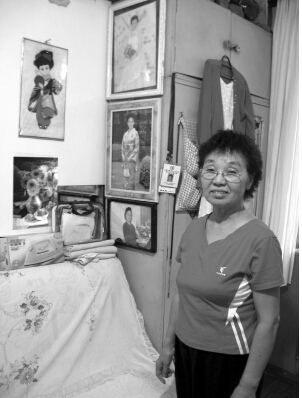A Japanese war child's lifelong journey home
- By Li Jingrong
 0 Comment(s)
0 Comment(s) Print
Print E-mail China.org.cn, August 15, 2015
E-mail China.org.cn, August 15, 2015
Gao Fengqin, 72, is one of about 4,000 Japanese children abandoned in China and adopted by Chinese families after World War II. Ever since her adoption, she has never stopped looking for her birth mother. The latest issue of China Newsweek tells her story.
 |
|
Gao Fengqin poses for a picture at her home in Harbin, Heilongjiang Province. [File photo] |
Japanese child brought up by Chinese parents
With Japan's imminent defeat in August 1945, Japanese refugees in China swarmed to train stations to try to flee to the coast in order to catch a boat back to Japan. Many Japanese women, together with their children, however, chose to stay in northeast China or Inner Mongolia, sometimes marrying local Chinese.
Da Zhigang, director of the Institute of Northeast Asia under the Heilongjiang Provincial Academy of Social Sciences, said nearly 3,000 Japanese children were abandoned in the region. Many were adopted and brought up by local Chinese families.
Gao and her birth mother fled to Harbin, capital of Heilongjiang Province. The child was five when she was given to a local family that already had two sons but treated the Japanese girl as their own child.
At first, the foster parents tried hard to keep her Japanese descent secret, but the news still spread like wildfire. Local children teased her as a "Jap" or called her "baka," meaning "idiot" in Japanese. Whenever this happened, the foster mother would take her door to door, trying to reason with the neighbors, but it always ended in a big fight.
Gao remembers her foster mother as a generous old lady and her foster dad and two elder brothers as very kind. One day in 1960, when she was 17, she told her foster mother she liked a fashionable skirt very much. Considering the poor family condition, her foster mother didn't reply immediately. However, she got two such skirts that night -- one from her brother and one from her foster father.
Gao married twice. At 18, she married a man named Shang Zhongyi, 36, and they had a son and a daughter. The marriage ended in 1977. Gao's second husband was nine years older than her, and she became the stepmother of his five children.
The long journey to find her roots in Japan
Gao has never stopped looking for her birth mother. She sent more than 20 copies of personal documents to the Harbin Municipal Public Security Bureau for registration and these were transferred to the Japanese authorities.
In 1979, the Harbin Municipal Public Security Bureau told her that her birth mother -- Akiko Kobayashi -- had lived with a Chinese man named Wang Zhifu in Laizhou, Shandong Province, and had given birth to a daughter. However, she boarded a boat from Hulu Island and set off alone for Japan in the wave of Japanese nationals returning home in February 1952.
The year 1982 witnessed the 10th anniversary of the normalization of China-Japan relations. On June 6 that year, Gao received a call from Kobayashi, then in her 70s, and the two were reunited in Harbin.
"She recognized me at first sight," Gao recalled. "Then, we burst into tears. We cried so hard that we didn't realize we had fallen to the ground, holding each other."
Gao took her birth mother home and treated her to dumplings. Before she left for Japan, Gao also gave her a fox scarf and gold ring left behind by her deceased foster mother.
However, after Kobayashi's return to Japan, she never replied to her daughter's letters. Not until 2010 did Gao learn that Kobayashi had died in 2008. Her plan to regain Japanese citizenship and look for the other members of her Japanese family was put aside again.
Our era is coming to an end: Gao Fengqin
In June 2011, Gao visited Japan with a tourist group at her own expense. Her eyes brimmed with tears as soon as the aircraft entered Japanese airspace.
In the Nagano Prefecture Peace Museum, she saw the documents of her grandfather and her family. She also found her grandfather's residence and asked if she could visit it, but was rejected by its current owner. She also wanted to pay a visit to her aunt who was still alive at that time, but this request was rejected too.
The question Gao has always had is why her birth mother didn't want to find her for so long. "Did she worry that I would affect her family in Japan or try to lay a stake on her property? Or maybe her children didn't want to see me? Who was my birth father? Why did my birth mother come to China to see me?"
Like fallen leaves that return to their roots, the 72-year-old hopes to be back and settle down in her hometown after many years spent overseas. "I spent 40 years doing a simple thing. Others can easily make it, but I failed because of my own mother."
Now, her foster parents have died, as have her brothers, her husbands and her birth mother. "Our era is coming to an end," she said sadly.






Go to Forum >>0 Comment(s)